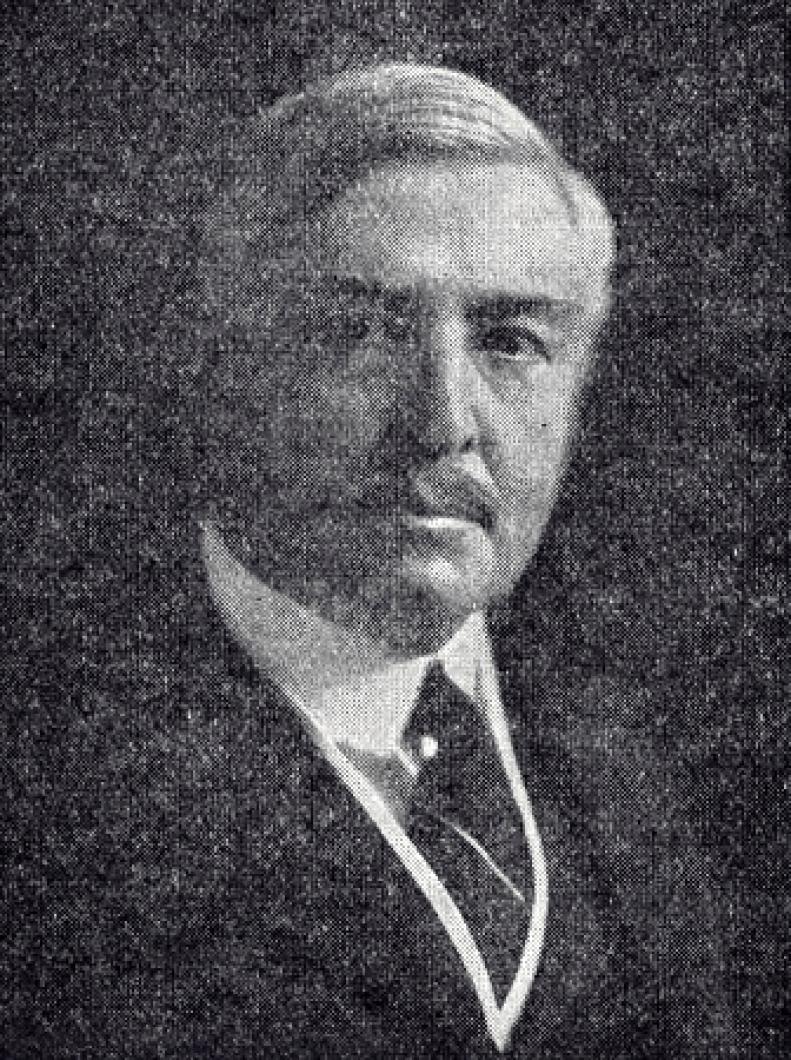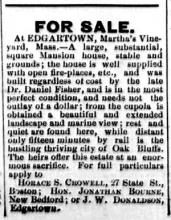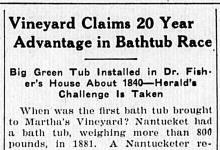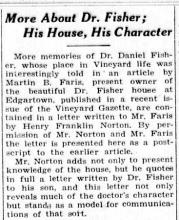A few years ago a newspaper cartoonist, who was portraying the childhood beginnings of many noted figures in American life, depicted William M. Butler, then United States senator, as he may have looked as a boy selling newspapers in Edgartown. The cartoonist’s choice might have fallen upon the old Hathaway, Soule & Harrington shoe factory in New Bedford where Mr. Butler was employed as an office boy in the fall of 1878; or it might have inked in that scene when Mr. Butler rode the first bicycle in New Bedford, an old high-wheeled affair, long before anyone could have thought of him in connection with any position in public life. Yet the emphasis placed upon a Vineyard scene was singularly appropriate and it serves to carry back to an early beginning indeed the lifelong association which Mr. Butler has had with Martha’s Vineyard, an association never closer than it is today while Mr. Butler is again in the national eye as a candidate for the Republican nomination for the senate.
Many famous men, including presidents, generals, senators and governors, have been visitors to the Vineyard, but in no previous instance is it recorded that a man as closely identified with the Island as Mr. Butler has served in positions of such importance in the United States government during his residence or summer residence here.
Loved Vineyard in Childhood
In 1925 Mr. Butler told the Vineyard Gazette, “I loved the Vineyard even in childhood, and it grows on me more and more as the years go by. It is a blessed Island, a place of happiness and health.”
Not of Island birth, he has come this close to being a Vineyarder by adoption; and if William M. Butler wins the nomination and is elected to the senate it will not be far amiss to call him a Vineyard senator.
Of all the attractions which are responsible for the coming of different families and individuals to the Vineyard, the camp meeting must be rated as one of the most important. Hundreds of summer residents are here because, long ago, an ancestor attended the yearly services at old Cottage City. The Butler family attended camp meeting year after year, Mr. Butler’s father, the Rev. James D. Butler, being a prominent speaker on several occasions.
William M. Butler was brought to the Island first as a baby in arms, at camp meeting time. A speaker at the recent Auld Lang Syne party in Oak Bluffs was under the impression that land for the meetings had been purchased from Mr. Butler’s father, but this seems not to have been the case. At any rate the connection of the future senator and the Island could hardly have begun much earlier than it did unless he had been a real native.
The continuity of the connection is made apparent by occurrences from year to year. For instance, in 1878 William M. Butler finished with school and spent a summer vacation on the Vineyard, making a walking trip around the Island in the company of three boyhood friends. The details of this trip may be found in a biography of Mr. Butler written by Edward E. Whiting four years ago. A journal of the expedition and rules and regulations for its conduct, in Mr. Butler’s own handwriting, are preserved.
These incidents and others like them are from the little known background of the man who was to become senator. Later on, when he had become a successful lawyer, a business man, and a prominent figure in public life, he is seen and heard of even more often.
In 1886 he married Miss Minnie Ford Norton of Edgartown, who died in 1905. There are three children of this marriage, Morgan Butler, Mrs. Theodore W. Ellis, and Miss Miriam Butler.
The Butler summer home at Edgartown was the former Dr. Daniel Fisher residence on Main street, now the property of Mrs. W. D. Faris. This property, for many years, has been one of the most attractive in the town.
Drawn Even Closer to Island
As his career developed, Mr. Butler was drawn even closer to the Vineyard, his success as a lawyer and his prominence in politics never standing in the way of his visits here. He removed from New Bedford to Boston, but he never withdrew from Martha’s Vineyard. A typical item from the files of the Vineyard Gazette during the early part of the century reads as follows:
“Hon. William M. Butler of Botson has his home here, but he is at the Hub most of the time. What with politics, railroad building and the law, his time is more than occupied. After all, he finds time to pass Sunday with his family and take a sail in the harbor, or criticise his new clubhouse, and drop in for a friendly chat with the boys at the Home Club where he is a welcome visitor. His residential estate is one of the features of the town.”
When a yachting division of the Home Club was formed, Mr. Butler was elected commodore.
Although the fact has never been widely known, and never known at all through his own statements, Mr. Butler aided materially in financing the Home Club and improvements to its property. But the outstanding contribution which he made to the development of the town is probably the Edgartown Water Company, in promoting which he played the leading part. Had it not been for Mr. Butler it is not too much to say that Edgartown would not have had a public water supply until years later.
As it was, in the year 1905 Mr. Butler launched the movement to bring water to Edgartown at a conference of prominent citizens whom he asked to meet at his home. So ably and energetically did he support the enterprise that within a year from the time that it was first broached, the idea had become a reality and water from Wintucket springs was running through the mains and being distributed to homes of the town. The whole matter was handled in a direct and businesslike way. Approval by the state board of health was given on May 3, 1906, and construction of the water system began the same month. The formal trial of the hydrants, marking completion of the municipal fire protection system, took place on November 29, less than a year from the first conference at which the idea of the water system was suggested.
He Sought No Credit
Although Mr. Butler gave liberally of his time, furnished leadership and invested funds, his name is not found looming above others in the contemporary reports. Characteristically, he sought no credit and was content with results rather with praise.
After many years as a summer resident of Edgartown, Mr. Butler disposed of his summer estate in that town in exchange for the widely known Windy Gates, at Chilmark, now owned by Roger W. Higgens. Later still he disposed of Windy Gates and began the development of Mohu, the summer place at Lambert’s Cove which has been visited by many thousands during the past few seasons on the occasion of benefits for the Martha’s Vineyard Hospital and other causes.
In 1907 Mr. Butler married Miss Mary Lothrop Webster of New Bedfird, as enthusiastic a lover of the Island as himself. Mrs. Butler has been active in supporting Vineyard causes and has identified herself with the life of the Island not only in summer but at other seasons of the year.
In the realm of politics, there are anecdotes concerning Mr. Butler and the Vineyard which can be told. One of them concerns a trip which Mr. Butler made here many years ago in the interest of a candidate for the Republican nomination to a state office. Mr. Butler called to see many of his friends, among them one who felt obliged to refuse his support to the candidate favored by Mr. Butler. He not only refused his support, but he found himself in the position of opposing, and partly through his opposition Mr. Butler’s candidate was badly defeated. Instead of doing the usual thing in politics, which would have been to go away angry with the friend who had stood against him, Mr. Butler paid a cordial social visit at this friend’s home. In so doing he showed that he respected the convictions of his friend and also that he was a good loser. This incident of sportsmanship came up this year when old Island friends were discussing Mr. Butler’s campaign for the senatorial nomination.
To Relieve the Strain
Again in the realm of politics, there is the statement which Mr. Butler gave to interviewers on the occasion of the last election in which he was a candidate. He had been asked what he intended to do the day after election, when the strain of the campaign had ended.
“Early in the morning of November 3,” Mr. Butler said, “I am going down to Martha’s Vineyard, which is one of the loveliest places in the world, and there, with some of my friends, I am going to spend a week shooting. I am going to see again the beauty of shore and forest, and I am going to breathe deep of salt winds that blow in from the sea across the Island.
“I have made all my plans to forget, for that week, all about the problems of the United States Senate, and to banish for those few days from my mind all the worries that go with service in Washington.
“That seems to be the best possible way to get, in one short week, the maximum of recreation, and the best way to get in form for the hard work ahead.










Comments